Yoshi Wada
Adventure Skier On A Mission
|
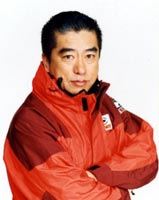
|
Introduction
Yoshi Wada has been an adventurer and extreme skier for more than 20 years.
With the spirit of a true adventurer and explorer,
Wada undertakes to climb the peaks he targets for skiing down.
This can sometimes mean trekking in for days to a mountain°«s location.
As part of a 10-Challenge Victory Series, Wada has conquered some of
the most remote mountains in the world, including Mt McKinley in Alaska,
Chinborazo in Ecuador, Mt Kenya in Kenya and Mt Altai in Mongolia.
Wada°«s 10th and final challenge is to trek to the live volcano Mt Erebus
in Antarctica, climb it, then ski down the mountain to the base.
Initially, Wada undertook the Victory Series because of a desire to
pit himself against the elements and overcome the extreme challenge of
skiing down preferably unconquered mountains-the more remote and unexplored the mountain the better.
|
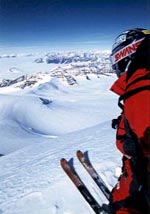
V9°°Greenland |
Now, however, Wada is driven by a philosophical determination as well.
During the days and weeks of isolation in some of the harshest environments on Earth,
he has come to accept and understand the importance of mankind maintaining life in
balance with the natural environment. This was brought home full force due to Wada
experiencing first-hand polluted °»black snow°… and glacial retreat, which can be
attributed in part to depletion of the ozone layer and global warming.
In an effort to communicate to the general public both his death-defying experiences in
isolation and his concerns for the environment, Wada undertakes regular speaking engagements,
holds photographic exhibitions and produces documentaries of his exploits.
|
Background
Wada was born in a mountain region of Japan°«s northern island of Hokkaido.
As a child he often had to get through waist-deep high snow to school during winter and would
spent up to six hours a day on skis-a solid grounding for his future as an adventure skier.
Wada became a professional skier at 21 and travelled to Europe on his first expedition. At 26,
he became the first person to rock ski down Mt Fuji. This challenge initiated Wada°«s 10-Challenge
Victory Series. |
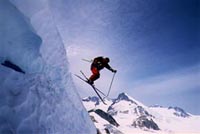
V7 Alaska
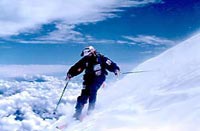
V5 Ecuador
|
|
Profile |
1976 | became professional skier | |
1983 | rock skied °»Mt Fuji°… (3776m), world first | |
1985 V1 | °»Matterhorn°… (4479m) in Switzerland from the peak, world first | |
1988 V2 | °»McKinley°… (6194m) North America°«s highest peak | |
1990 V3 | °»Jaya°… (5030m) in Indonesia, first peak on the equator | |
1991 V4 | °»Kenya°… (5198m) in Kenya, second peak on the equator | |
1991 V5 | °»Chinborazo°… (6310m) in Ecuador, third peak on the equator | |
1993 V6 | °»Mt Altai°… (4200m) in Mongolia, world first | |
1995 V7 | °»Juneau Ice Field-200km°… in Alaska (skied glacier, three mountains and conquered
a 67-degree downhill slope) | |
1998 V8 | °»Yushan°… (3950m) in Taiwan, world first | |
2000 V9 | °»Mt Gunnbiorn°… (3700m) in Greenland, highest point in Arctic Circle
|
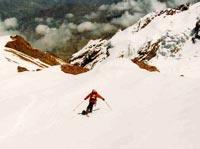
Training on Mt Illimani (Bolivia)
|
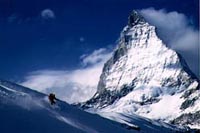
Training on Mt Zermatt (Switzerland)
|
10-Challenge Victory Series
Active Volcano Mt. Erebus in Antarctica | |
Ę°Concept | Reveal the wilderness of Antarctica and its environment | |
Ę°Theme | The Earth-Forever Beautiful | |
Ę°Expedition Team | Yoshi Wada, skier
John Svenson, leader of Mountain climbing
Support member (2 people), Photographer (1 person)
(separate team) TV production (3~5 people)
|
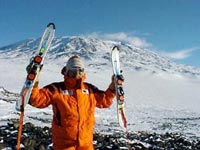
Mt Erebus research trip 1999
|
Iceberg in Ross
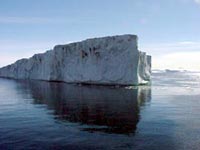
|
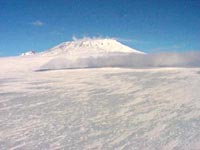
Mt Erebus
|
Wada has chosen to conclude his Victory Series on the active volcano, Mt Erebus (3794m) in Antarctica.
He selected this mountain for a number of reasons: | |
| Mt Erebus as an active volcano represents to Wada a sign that the Earth is a living,
breathing entity and he wishes to see that °»life°… up close. | |
| Antarctica°«s fragile environment, like the Arctic Circle°«s,
is threatened among other things by global warming and ozone depletion. Wada would like to
draw public attention to this as there are already other signs such as the desertification
in Africa and the glacial retreat occurring in South America that indicate Mother Earth needs
our care and attention. | |
| As an adventure skier, Mt Erebus in this isolated part of the world offers Wada
sufficient challenge for him to want to conquer it. At the same time, he can see and experience the beauty
and wonder that is the extreme wilderness of Antarctica.
|
|
Schedule | |
| 1992 | | Planning to ski iceberg in Antartica | |
| 1997 | | Research trip to Argentina | |
| 1998 | | Select active volcano Mt. Erebus in Antarctica | |
| 1999 | Feb | Research trip to Antarctica and Mt Erebus | |
| 2000 | June | Polar region expedition begins
Downhill ski from highest point in Arctic Circle, Mt Gunnbiorn, | |
| 2000/01 | Mt Erebus expedition postponed | |
| 2001 | July | Mt Erebus expedition training begins
Mountain bike across Japan (Kagoshima to Sapporo, approx. 2600km) | |
| | Sept | Altitude adjustment training in Bolivia, Mt. Illimani | |
| 2001/02 | Expedition postponed due to 9/11 terrorist incident | |
| 2002 | July | Training in Japan | |
| | Aug | Ski training in South Island of New Zealand | |
| | Sept | Ski training in South Island of New Zealand | |
| | Oct | Training in Japan | |
| | Nov | Altitude adjustment training in Switzerland, Mt Zermatt | |
| | Dec | Final training in New Zealand, Mt Cook and Tasman Glacier | |
| | 24 approx | To Hobart, Tasmania, final check for Mt Erebus expedition | |
| 2003 | |
| | Jan 3 | Depart Hobart to Antarctica | |
| | Jan 20 | Arrive Ross Island
V10 Challenge, Mt. Erebus | |
| | Feb 14 | Depart Ross Island | |
| | Feb 24 | Arrive Bluff, NZ |
|
|